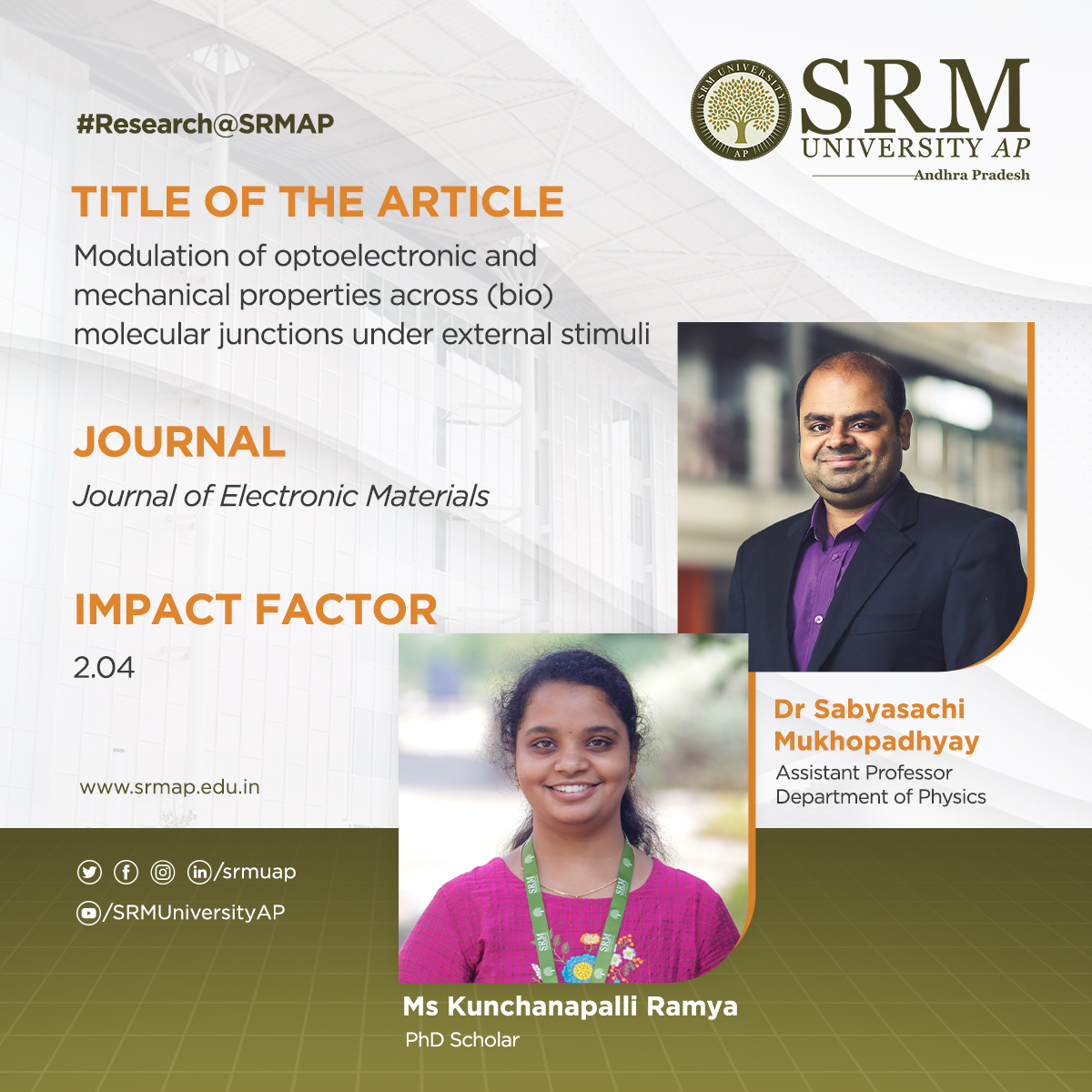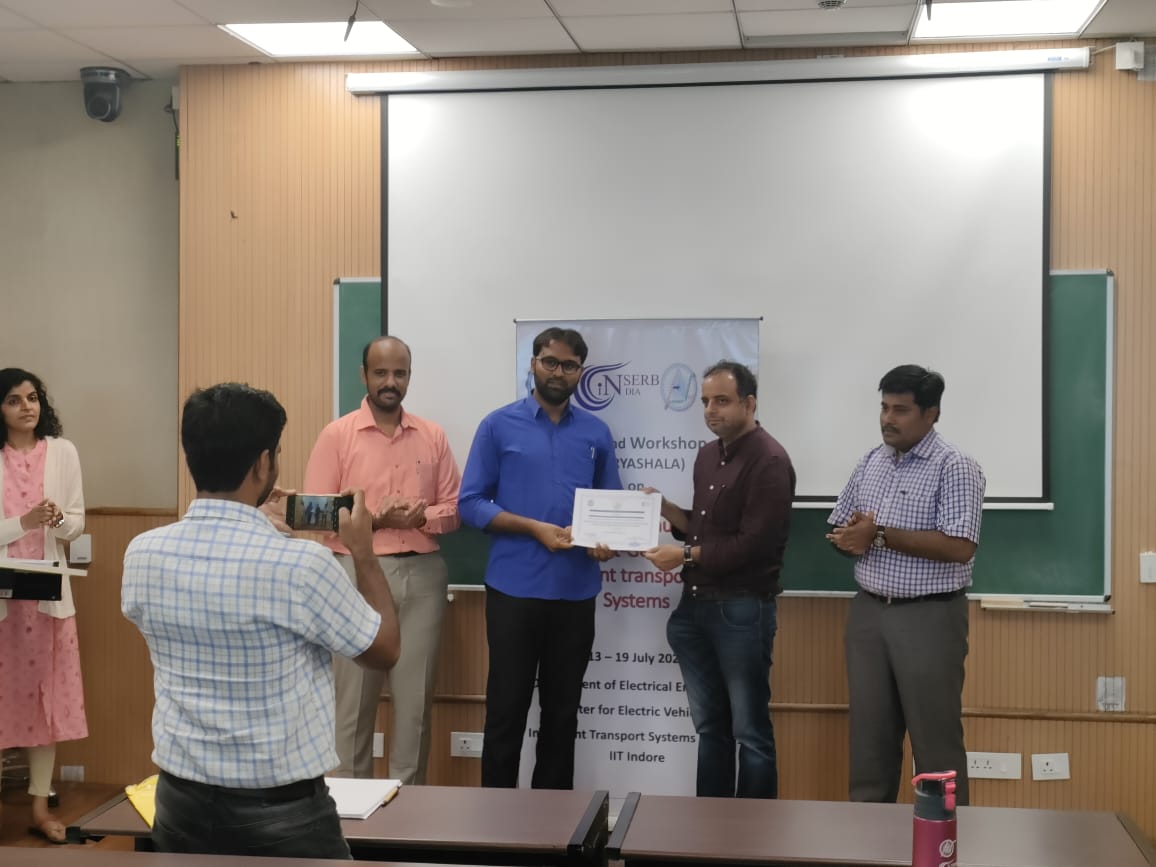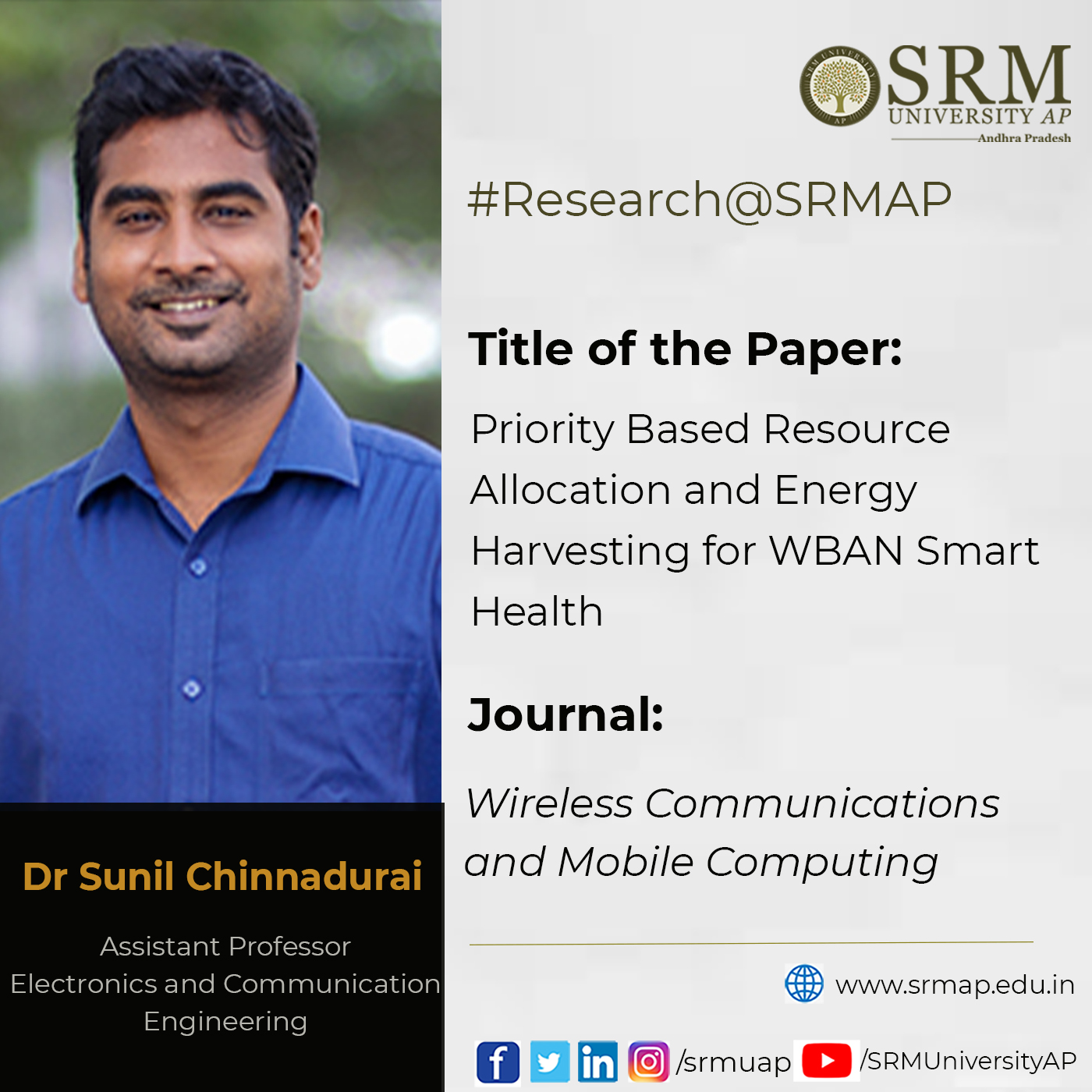- Exploring the charge transport across protein-based molecular junctions August 2, 2022
 The latest research at the Department of Physics is investigating the charge transport across protein-based molecular junctions. Researchers envision fabricating bio- FETs which is useful in electronic devices as an alternative to Si- technology. Assistant Professor Dr Sabyasachi Mukhopadhyay and his PhD scholar Kunchanapalli Ramya published their paper Modulation of optoelectronic and mechanical properties across (bio) molecular junctions under external stimuli in the journal of Electronic Materials with an impact factor 2.04.
The latest research at the Department of Physics is investigating the charge transport across protein-based molecular junctions. Researchers envision fabricating bio- FETs which is useful in electronic devices as an alternative to Si- technology. Assistant Professor Dr Sabyasachi Mukhopadhyay and his PhD scholar Kunchanapalli Ramya published their paper Modulation of optoelectronic and mechanical properties across (bio) molecular junctions under external stimuli in the journal of Electronic Materials with an impact factor 2.04.Abstract
Molecular junctions are formed by wedging molecules between two metal electrodes. Besides the conventional parameters of the metal-molecule-metal junction, such as the work function of electrodes and the molecules’ energy gap, molecule-electrode electronic coupling strength also plays a vital role in modulating the electronic properties of the molecular junction under external stimuli. We have also calculated several transport parameters which play a crucial role in finding the origin of conductance modulation under the external stimuli. We could find that before particular humidity conditions, the modulation in the conductance is due to the variation in coupling strength, which is due to the modulation in the electrostatic environment of retinal chromophores of protein by changing the structure of protein under various external stimuli.
Researchers have explored the external stimuli (illumination, force, and humidity conditions) effect on charge transport across bacteriorhodopsin-based molecular junctions. Their future research plans include bio- FET fabrication with the protein reported and studying the transistor characteristics across it.
Continue reading → - Mr Shaik Rajak attended the SERB-funded workshop on vehicular communication August 2, 2022

The students of SRM University-AP leave no stone unturned to expand their knowledge horizons and strengthen their research endeavours as they are trained to translate every single experience into lessons of learning fortifying their perpetual journey as researchers, teachers, or entrepreneurs. The university facilitates them to explore all possibilities of learning paving their way to becoming complete professionals. They are encouraged to partake in numerous activities such as seminars, conferences, and workshops happening within and outside the country.
It is a cause for pride to know that one of our PhD scholars, Mr Shaik Rajak from the Department of Electronics and Communication Engineering, working under the guidance of Dr Sunil Chinnadurai, has attended the prestigious Science and Engineering Research Board (SERB) funded High-end Workshop on Vehicular Communications for Next-Generation Intelligent Transportation Systems conducted at IIT Indore. Mr Rajak was one of the few participants who was invited to attend the workshop based on his merit and research publications out of 300+ applications received from all over the country.
The workshop deliberated upon the future of the transportation industry of the country. The present transportation infrastructure demands efficient intelligent transportation systems (ITS) because of the increasing population, traffic congestion, etc. Vehicular communication is a key enabler for the next-generation ITS applications such as platooning, remote vehicle monitoring, etc. The fundamentals of vehicular communication systems along with advanced coding techniques, modelling of vehicular channels, various radio access technologies for next-generation ITS, connected and automated vehicles, unmanned aerial vehicle (UAV) communication, ITS standardization activities, vehicular Internet-of-Things (IoT) networks, and advanced network security techniques specific to vehicular networks were discussed in the meeting.
The workshop immensely helped Mr Rajak to learn more about his research areas; the advancements in the field of intelligent transportation systems, the current challenges, and a few research directions to solve the existing problems. “I could meet with many speakers and participants from various IITs, NITs and other central universities and get involved in enriching discussions,” he said. “The hands-on sessions also gave a better perspective on the existing knowledge base” added Mr Rajak. The workshop augmented his research outlook on ITS, vehicular channels: its characterisation and modelling, advanced coding techniques in vehicular communications, and vehicular IoT networks in real-time scenarios. He marked his gratitude to SRM University-AP for granting him an opportunity to be part of the high-end workshop.
Continue reading → - The future directions of WBAN technology August 2, 2022
 Integrated short-range wireless technologies are becoming the most sought-after machinery in recent years. The possibilities of its applications are expanding with the emergence of new health conditions and concerns. Assistant Professor of the Department of Electronics and Communication Engineering, Dr Sunil Chinnadurai’s recent research focuses on the future of this technology. His paper titled Priority Based Resource Allocation and Energy Harvesting for WBAN Smart Health got published in the journal Wireless Communications and Mobile Computing with Impact Factor 2.34. He worked with Dr Poongundran Selvaprabhu, Assistant Professor, Vellore Institute of Technology, for this project.
Integrated short-range wireless technologies are becoming the most sought-after machinery in recent years. The possibilities of its applications are expanding with the emergence of new health conditions and concerns. Assistant Professor of the Department of Electronics and Communication Engineering, Dr Sunil Chinnadurai’s recent research focuses on the future of this technology. His paper titled Priority Based Resource Allocation and Energy Harvesting for WBAN Smart Health got published in the journal Wireless Communications and Mobile Computing with Impact Factor 2.34. He worked with Dr Poongundran Selvaprabhu, Assistant Professor, Vellore Institute of Technology, for this project.Abstract
With the emergence of new viral infections and the rapid spread of chronic diseases in recent years, the demand for integrated short-range wireless technologies is becoming a major bottleneck. Implementation of advanced medical telemonitoring and telecare systems for on-body sensors needs frequent recharging or battery replacement. This paper discusses a priority-based resource allocation scheme and smart channel assignment in a wireless body area network capable of energy harvesting. The project investigates the researcher’s transmission scheme in regular communication, where the access point transmits energy and command while the sensor simultaneously sends the information to the access point. A priority schedule non-pre-emptive algorithm to keep the process running for all the users to achieve the maximum reliability of access by the decision-maker or hub during critical situations for users has been proposed. During an emergency or critical situation, the process does not stop until the decisionmaker, or the hub takes a final decision. The objective of the proposed scheme is to get all the user processes executed with minimum average waiting time and no starvation. By allocating a higher priority to emergencies and on data traffic signals such as critical and high-level signals, the proposed transmission scheme avoids inconsistent collisions. The results demonstrate that the proposed scheme significantly improves the quality of the network service in terms of data transmission for higher priority users.
Explanation of the research
A priority scheduling non-pre-emptive algorithm with SCA for WBAN smart health is proposed. The potential advantage of this algorithm is to keep on running the process for all users to attain maximum reliability until all the processes are executed. The data traffic associated with the priority scheduling non-pre-emptive algorithm is categorised into four major sub classes, namely, emergency, on-demand, normal, and non-medical data signals in order to assist the different QoS requirements. The results indicate that the priority scheduling non-pre-emptive algorithm performs during emergency and on-demand signals compared to the novel priority-based channel access algorithm for contention-based MAC (NPCA-MAC), low-rate wireless personal area networks (LR- WPAN), and priority-based adaptive schemes.
WBAN is a precise technology requiring frequent recharging or battery replacement. During the emergency or critical rescue situation, the highest priority user information is processed with minimum service delay without compromising the QoS. In addition, the proposed method prioritises the sensor nodes and classifies data traffic into emergency- (highest priority-), on-demand- (minimum priority-), normal (lowest priority-), and nonmedical- (normal-) based applications.
The future directions of WBAN are dealing with smart WBAN healthcare, trust management, trust negotiation, data security, uninterrupted lifetime, and intelligent decision-making (enhance the predictions from prior information) processes.
Continue reading → - Dr Pankaj Bhalla August 1, 2022
- Dr Vineeth Thomas August 1, 2022

